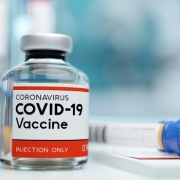Oxford University’s Covid-19 vaccine candidate has a better immune response when a two full-dose regime is used rather than a full-dose followed by a half-dose booster, the university said, citing data from early trials.
AstraZeneca, which is jointly developing a Covid-19 vaccine with the University of Oxford, plans to begin clinical trials testing the company’s vaccine in combination with Russia’s Sputnik V vaccine by the end of 2020.
AstraZeneca and Oxford University have more work to do to confirm whether their Covid-19 vaccine can be 90% effective, peer-reviewed data published in The Lancet showed, potentially slowing its eventual rollout in the fight against the pandemic.
AstraZeneca U.S. Covid-19 vaccine trial results likely in late January 2021
"Operation Warp Speed" Initiative, AstraZeneca, Brazil, Clinical Studies, Clinical Trials, COVID-19 Vaccines, Data, Department of Health and Human Services (HHS), Efficacy Data, Emergency Use Authorization, Health Officials, Oxford University, R&D, Scientists, U.S. government, United KingdomAstraZeneca Plc will likely get results of the company’s U.S. Covid-19 vaccine trial in late January 2021 and could potentially file for an emergency authorization, the chief adviser for the U.S. government’s Operation Warp Speed program said.
Defying Skeptics, Pfizer and Moderna Gun for Global Covid-19 Vaccine Approval
BioNTech, China, Clinical Trials, Covid-19 Data, COVID-19 Vaccines, Drug Distributors, Emergency Use Authorization, Europe, European Medicines Agency, FDA/Regulatory, Health Canada, McKesson, Medicines and Healthcare products Regulatory Agency (MHRA), Moderna, NPR, Oxford University, Oxford University’s Jenner Institute, Pfizer, Product Pipelines, R&D, Russia, SwissMedic, United KingdomIf all things go well, the Pfizer-BioNTech Covid-19 vaccine will receive EUA from the U.S. Food and Drug Administration around December 10 or within a few days after, and the Moderna vaccine will receive EUA around December 17 or within a few days after.
The Covid-19-causing coronavirus is mutating while spreading around the world in the pandemic, but none of the mutations currently documented appears to be making the SARS-CoV-2 virus able to spread more rapidly, scientists said.
It took Oxford University’s brightest minds decades of work to give them the expertise to develop a Covid-19 vaccine.
AstraZeneca said on Monday the company’s Covid-19 vaccine could be as much as 90% effective, giving the world’s fight against the global pandemic a new weapon, cheaper to make, easier to distribute and faster to scale-up than rivals.
With all the expectations for available Covid-19 vaccines based on the successful late-stage trial results reported by Pfizer/BioNTech and Moderna, the looming question is: when will the public be able to start getting the vaccines?
U.S. and European regulators could approve Pfizer and BioNTech’s experimental Covid-19 vaccine as early as mid-December, the German firm’s chief executive said, following the release of positive trial results.










